Spoiler alert for a 29-year-old game: Monkey Island 2: LeChuck’s Revenge has a divisive ending. As the adventure approaches its climax, Guybrush Threepwood is forced to confront the evil pirate LeChuck deep within the tunnel system of Dingy Island. It is here LeChuck reveals he is none other than Guybrush’s older brother. But that’s just the penultimate twist. After a back and forth round of voodoo-doll shenanigans followed by reluctant mea culpas, the treasure-hunting Guybrush and the undead LeChuck exit the tunnel system together, only to have morphed into kids separated from their parents at a modern amusement park.
As a fledgling gamer still in the single digits, I had a simple, straight-line explanation for this bizarre and controversial ending: A kid could be both a kid and a pirate at the same time. Why? Because a kid could be any damn thing he wanted to be.
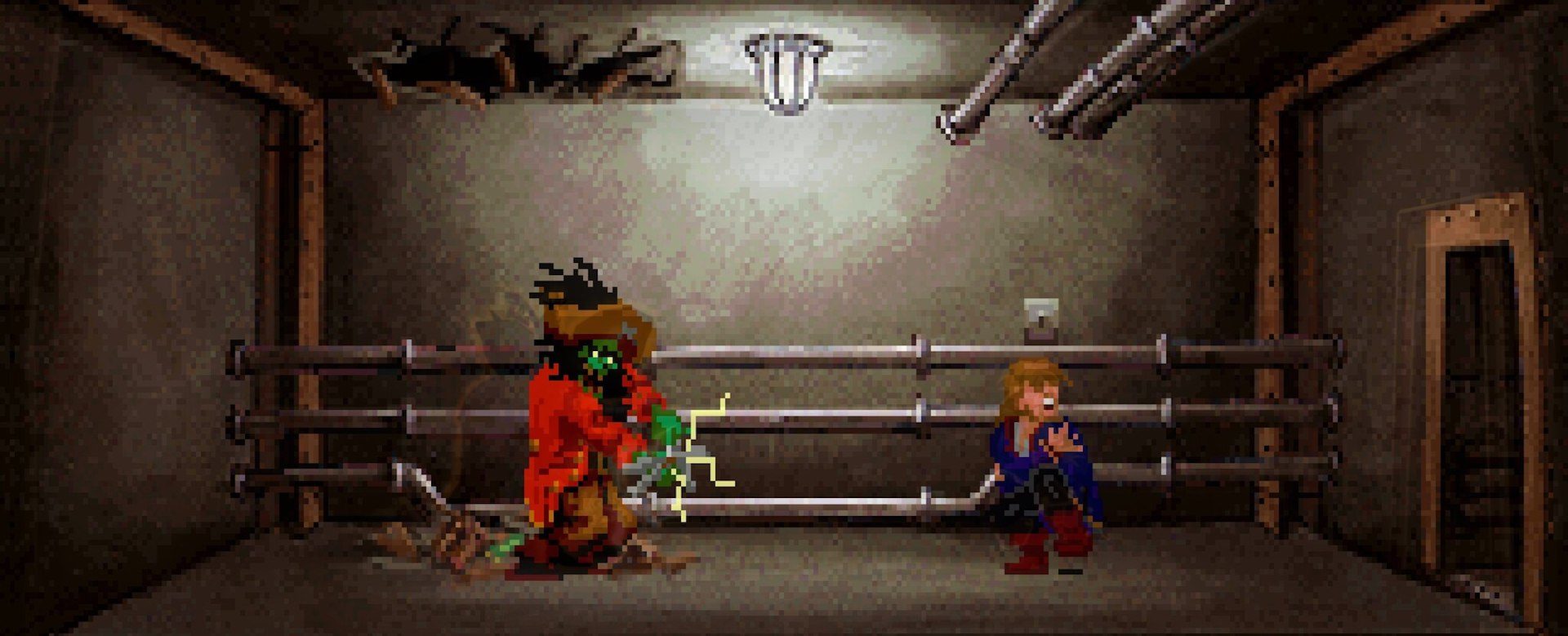
Credit: LucasArts
In a time when writer/director/developer Hideo Kojima is compared to Martin Scorsese and Terrence Malick, and Take-Two can enjoy a stock spike just from teasing a new Rockstar game, it may seem as though the simple point-and-click adventures of yesteryear are little more than nostalgic glimpses into the infancy of an art form. And yet games that share the same DNA as Monkey Island, with their challenging puzzles, delightfully simple animation, and snappy dialogue choices, are actually alive and well. They’re living in your app store.
Like any Kojima epic, a successful mobile game, too, requires good writing—both engrossing enough to keep you invested in the story and efficient enough to keep you playing. But just how different is the writing process for a mobile game? And what is it like being a mobile writer when the culture increasingly celebrates the artistic achievements of traditional console and PC games?
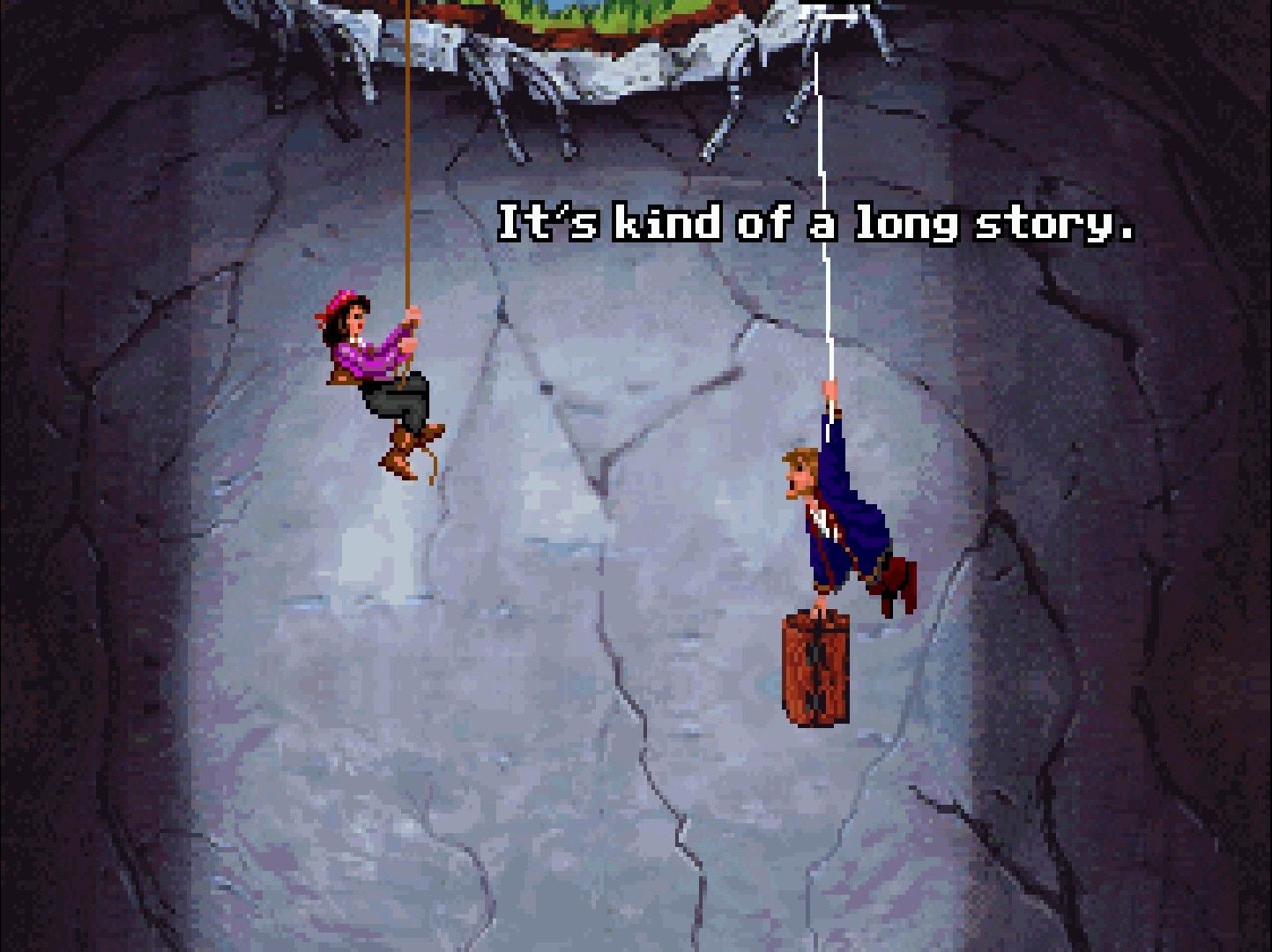
Credit: LucasArts
Eric Stirpe writes mobile games, and he happens to share my affinity for Monkey Island. For him, the series did more than make the argument for a child’s plastic sense of reality. It ignited a career path. “My first inspiration to be a writer… was when I played Secret of Monkey Island,” he told me during our phone conversation. “But what was so funny was it took me the better part of a decade and a half to sort of realize I could write video games.”
Before turning to mobile, Eric Stirpe worked at Telltale Games, where he wrote for The Walking Dead: Season Two, Tales from the Borderlands, and Minecraft: Story Mode. He credits his sister-in-law for helping spark the idea that mobile could be a viable path. “She kind of showed me this whole ocean that existed of all of these mobile narrative games that were either dating sims or visual novels, and it was a moment like that where it’s like, okay, this is a good thing to keep an eye on because it feels like something that has options.”
Options—and a large, growing userbase. According to a market report published by Newzoo in October of last year mobile games will have accounted for 46 percent of a $148.8 billion gaming market in calendar 2019. (Newzoo has not yet published final data for the year.) Console and PC games, by comparison, were projected at 30 percent and 24 percent, respectively. It’s not so much that mobile is overtaking traditional console and PC games—both groups are projecting steady growth—but that mobile has found a way to add to the ever-expanding pie.
Though games like Fortnite have found success in both the traditional and mobile space, a casual browse through your app store will reveal a plethora of titles specifically designed for mobile’s tapping and swiping haptics. Among these are uber-popular war strategy games like Clash of Clans and now-ubiquitous match-3 puzzle games like Lily’s Garden and Homescapes, where players complete puzzles to earn gems that are then used to decorate various settings within the world of the game.
Stirpe wrote for Frozen Adventures, Jam City’s recently released match-3. With Disney’s resilient Frozen IP and the corresponding release of Frozen 2 in theaters, Frozen Adventures is a surefire hit. Still, writing any match-3 game comes with unique challenges, especially when these titles are paired with characters and narrative storylines that advance as you complete each level. Level counts in the hundreds are common, and content updates can occur weekly.
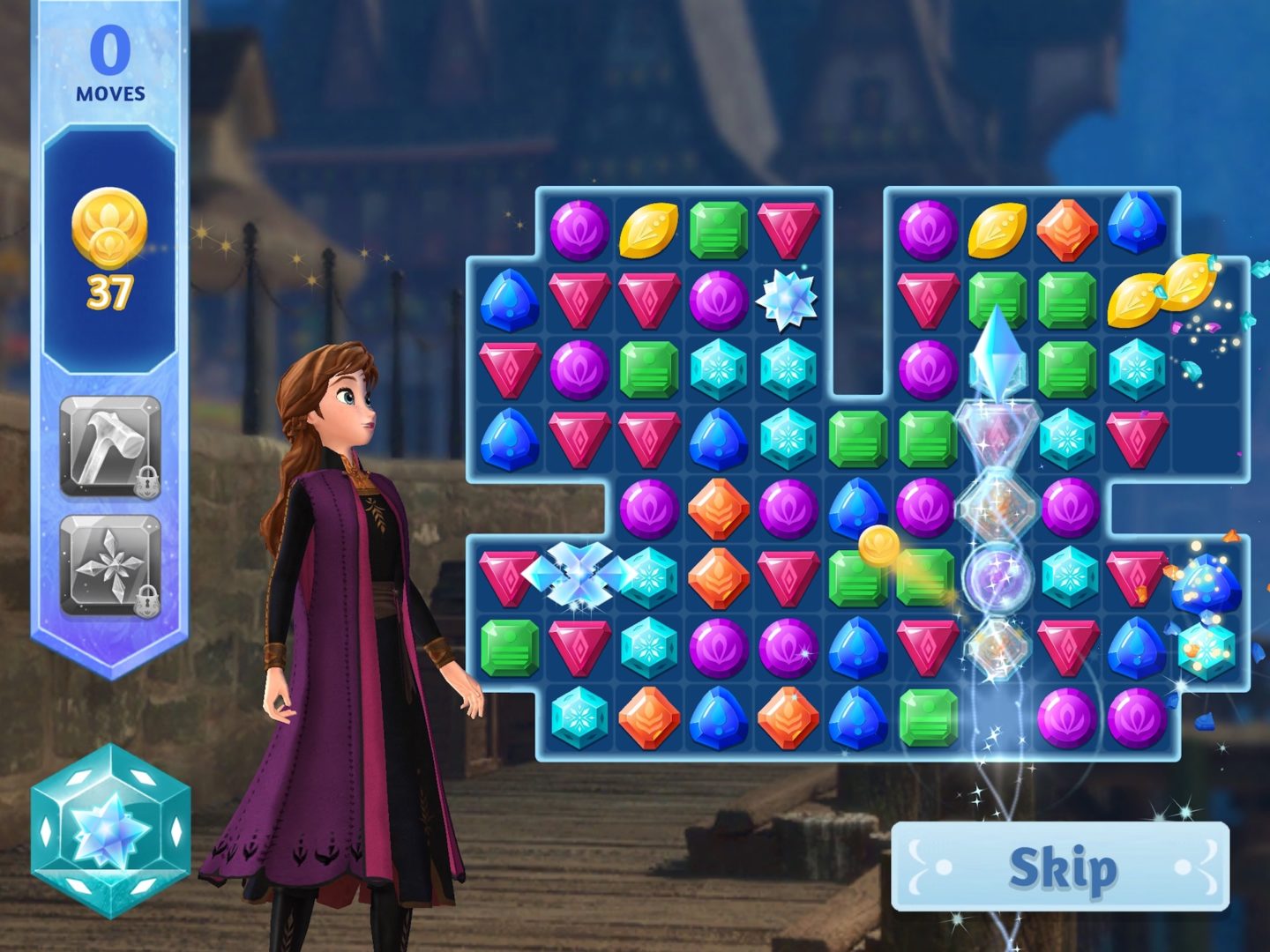
Credit: Jam City
Zack Keller is a narrative director at King, the mobile developer behind the multibillion dollar match-3 juggernaut Candy Crush Saga. He said King’s narrative team focuses on “integration, not interruption” when it comes to story development. “Our aim is elevating their experience by giving them character and story-based reasons to keep playing: conflict, cliffhangers, surprises, secrets, characters with wants and desires,” Keller said. “However, due to screen real estate and attention spans, we must be as expeditious as possible with our narratives. The plus side, though, is that we have literally thousands of levels to build a huge, overarching story in tiny, bite-sized pieces.”
If “thousands of levels” seems like development overkill, you may be surprised by the average mobile gamer’s appetite. “For folks that are new to that [mobile] world, I feel like they underestimate just how much content someone can go through,” Stirpe said. “Often the initial plan for a launch doesn’t have nearly enough content. That’s usually one of the first things that happens is you sort of say, ‘Okay, the first chapter will be at launch and then after that we’ll do this, that, and the other thing,’ and then you start to do play testing and it’s like, people got through the first chapter in 10 minutes.”
While the production team scrambles to keep up with the demands of content-hungry users, the sheer number of levels also influences story considerations. When working on these games, Stirpe said it’s important to lean hard onto the character side of things, as opposed to relying on people remembering every aspect of the plot. “If you’re telling a story over the course of, say, a hundred levels, there are going to be some people who burn through those hundred levels in a weekend. And there are going to be some people who take literally months to get through those hundred levels.”

Credit: King
When volume is a concern, Stirpe often turns to an old form of entertainment for inspiration: soap operas. “Some of these [soap operas] have been running 30, 40 years, [with] new episodes every week, every day. It’s insane the amount of content they have popped out.” Though Stirpe acknowledges some mobile games have a reputation for being cheesy or salacious, he believes crazy plot twists can be useful for getting someone to keep playing. “You are never going to get someone’s full attention when you’re on mobile,” he said. “I think maybe someday mobile will be something people give their full attention to but, as of right now, it is really hard to say this is only going to work if someone puts their full attention on it.”
That’s because the people playing these games aren’t always in the ideal setting. Stirpe said it’s crucial for developers and writers to realize that a lot of people will be playing these games under their desks or in bed at the end of the day. “It’s funny because one of the big things with mobile is you have to assume that 95 percent of people are going to be playing with the sound off,” he said. “And so any plan you have that relies on saying, like, ‘Oh, well the voice actor will sell this,’ or, ‘Oh, there will be a sound in the background,’ that’s already a losing plan from the get go.”
Stirpe thinks writers can get discouraged by only being able to rely on text, but he offers a parallel to mobile games and the classic console and computer games of decades past, like SNES games that controlled the speed at which text came on screen to deliver a moment, or made a joke land by simply putting “…” as a character’s response.
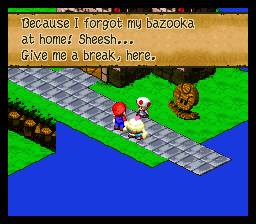
Credit: Nintendo
For Keller, issues arise when the text is trying to serve multiple functions. “Mobile games are often criticized for wooden, tutorial-heavy text which masquerades as character dialogue,” Keller said. “I’ve tried to combat this by focusing on the sleight of hand magic trick that is making the characters come alive through natural dialogue while subconsciously teaching the player what they need to do to play the game.”
Screen real estate is also a major factor in determining what dialogue that makes the final cut. Keller compared it to his time working in TV, film, and traditional gaming. “In mobile, every tap must be compelling,” Keller said. “You need to condense your work down to diamonds.” And not having the luxury of thousands of lines of dialogue to build a story can make for a difficult transition. “Now, I have only a handful of words to convey something that’s entertaining and emotional,” he said. “The whole ‘writing is rewriting’ ideology applies more than ever as you need to write directly and edit ruthlessly in order to make your story fit.”
Despite mobile gaming’s market share—an estimated 46 percent last year, you’ll recall—popularity doesn’t necessarily translate to a positive perception among gamers, let alone the kind of exposure that traditional gaming gets in the press.
Many writers, including Stirpe, acknowledge the discrepancy. “The thing I’ve tried to wrap my head around is the mobile stuff I’ve worked on has been, or will be, probably some of the most played stuff I’ve worked on.” It’s wild to think about, he said, because the amount of feedback he receives on a Telltale title usually outnumbers the feedback he receives on a mobile title he’s penned. “There’s this prestige of, like, if you work on a big triple-A game, and it comes out, and then you know everyone’s talking about it all over Twitter or social media… there’s that feeling of like, ‘Oh, that thing I made is important, and it’s out there.’ And I think for a lot of folks working on mobile games doesn’t have that same thing.”
This sense of lesser prestige may have something to do with the way the players engage with these wildly popular mobile titles. “The people who are fans of like, say an Episode or Choices franchise, they might not be on a place like Twitter, but where they will be is… some place like Tumblr and excitedly share all the new releases,” Stirpe said. Or, he added, they might be going nuts on a message board every time there’s a new content update.
The fans Stirpe referred to are likely not the same gamers investing 50 hours into Death Stranding, or camping out at a PAX show. In fact, the popularity of mobile games can be partly explained by the increasing number of new female gamers, and the rise of mobile titles that attempt to draw them in. According to a January 2019 survey conducted by Altman Vilandrie & Company, women and men now play video games at nearly the same rate, with 33 percent percent of women described as “mobile only,” compared to 15 percent of men.
PocketGems’s Episode, Pixelberry’s Choices, and Fogbank’s Storyscape are three mobile narrative apps that allow players to choose from a multitude of episodic choose-your-own-adventures, many of which appeal specifically to the female demographic and take place in high school. Both Storyscape and Episode have incorporated popular brands into their female-driven titles. Storyscape (owned by FoxNext Games) recently launched its own version of Titanic, inspired by the James Cameron film, while Episode has adapted titles like Clueless and Mean Girls onto its platform. But to suggest these games are one-trick-ponies would be disingenuous. Mysteries are another common genre on the platform, and titles like Storyscape’s The X-Files shine.
I spoke with a former writer for Episode who chose to remain anonymous for this piece. They said they were initially attracted to the choose-your-own-adventure aspect and the different narrative branches a story could travel down, but expressed hesitation when asked how it translated to the game’s freemium model. The problem, they said, isn’t that you can’t complete a story without paying money; it’s that you’ve essentially guaranteed yourself a less desirable outcome by not doing so. The result is that the standard, free conversations the characters engage in are written with less energy, and in a way that suggests to the player they are missing out on something. “It’s FOMO in a game, basically.”
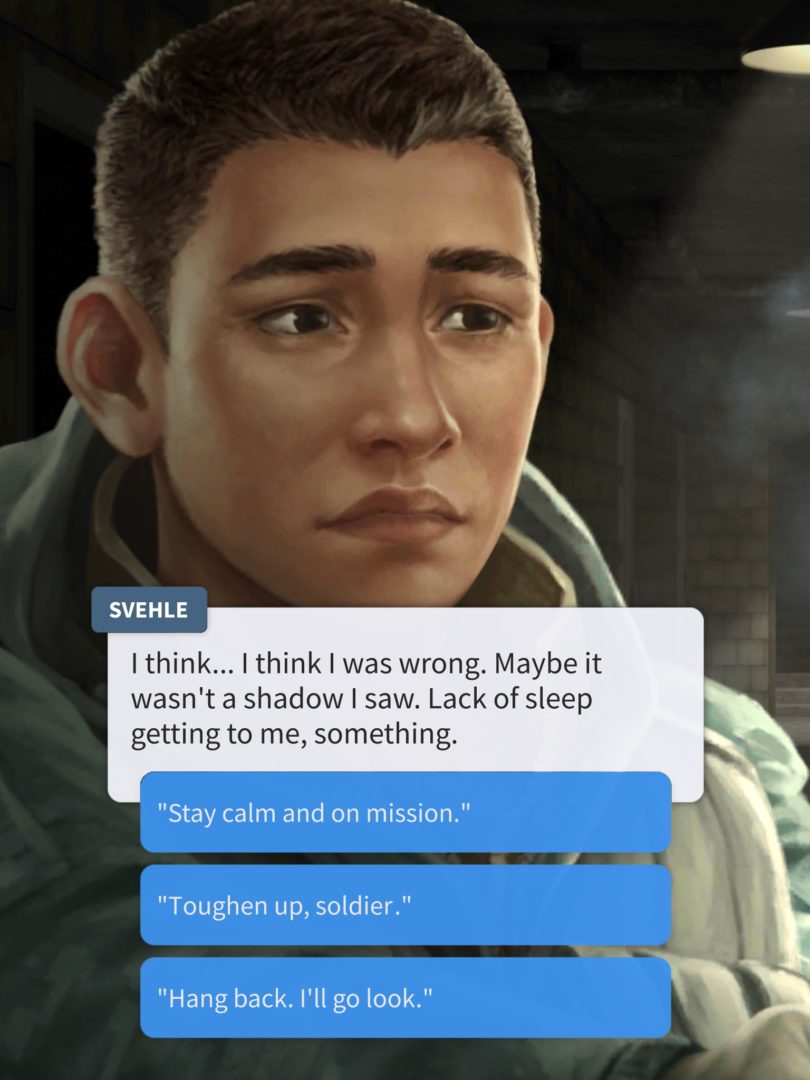
Credit: Storyscape
The writer compared it to finishing a story without getting the perfect storybook ending. Even though you receive gems as you progress through the chapters, it’s never enough to get you what you really want. “You can do that and keep playing the game, but we were incentivized to write in a way that was, you know, the story is a little bit less fun that way. [The love interest] is like, ‘Oh, I see you didn’t really try [with] what you wore’… But if you dress nicely he’ll compliment the crap out of you over and over.”
Choosing one of the premium options like, say, going on a date with your crush, means being subtly rewarded during future interactions with them. It’s a way of honoring your monetary commitment. “I will say [the Episode designers] went out of their way to make sure you were constantly reminded that what you did paid off,” the writer said.
Incentivizing gamers to pay for a marginally better experience is a common revenue model for mobile games—and many online-based console and PC games, too, for that matter. It’s unclear whether appealing to a 12-year-old’s desire to snag the perfect Hollywood lover is inherently more exploitative than encouraging a 35-year-old to ante up for a nicer pair of boots in Red Dead Online, even though Pocket Gems does ad target social platforms like Instagram and Snapchat to increase its young female audience. What can be said is that the quantity of available mobile games, and the rate at which they are released, has allowed the medium to embrace diversity on a scale not always found on other platforms.
Stirpe thinks the relatively lower production cost, in particular, has allowed more voices to shine in mobile, through LGBTQ perspectives and “more marginalized stories.” And because so many of them require so much writing, Stirpe believes there are a lot of opportunities for more junior writers and writers who might not live in one of the big tech cities like San Francisco or L.A.
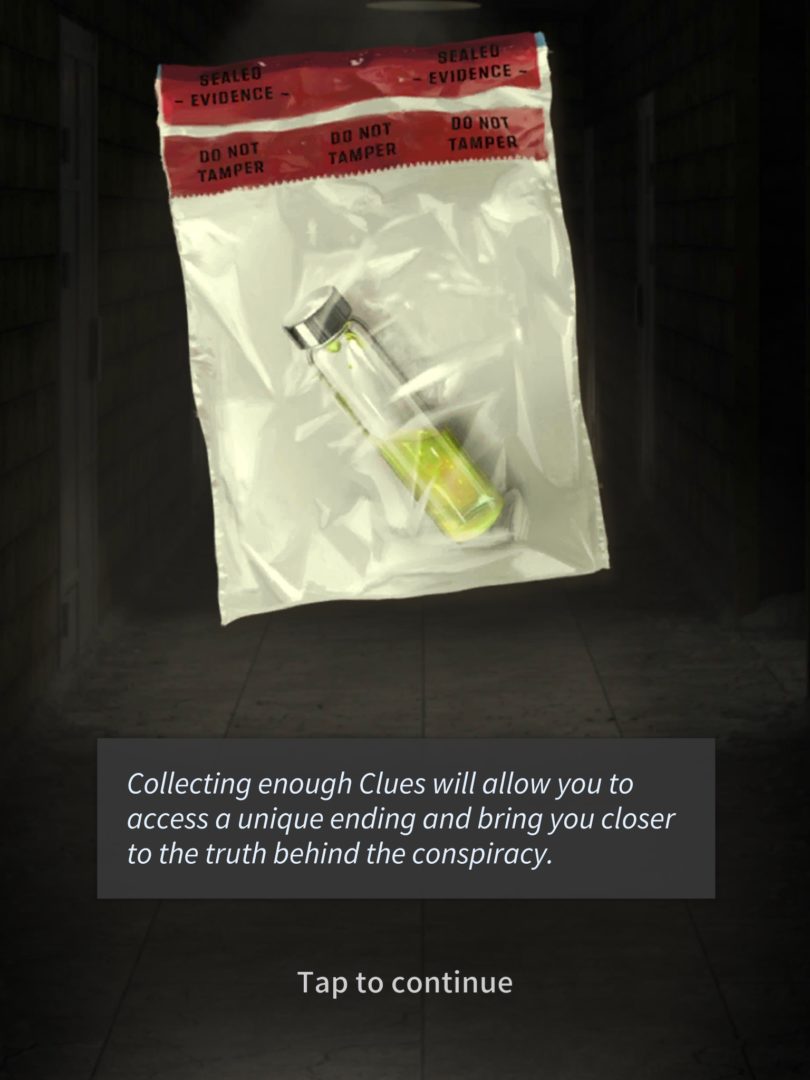
Credit: Storyscape
If mobile games are perceived as pulpier or less prestigious than their console and PC counterparts, Stirpe believes there’s an underlying positive. “Mobile narratives tend to have an audience that’s very passionate, very loyal.” Furthermore, he posited that there are fewer egos working in the mobile space because creators are more focused on simply making quality stuff for their audience. “It’s so easy to write off some of these more kind of niche avenues and say… we can put whatever writing in there, no one will notice or care anyways,” he said. “But [to] the people that are fans and love these things, it deserves good writing.”
It’s hard to imagine how Monkey Island would resonate if it were released for the first time today, though it seems like mobile would be the ideal platform. And it’s a purely academic exercise to compare the difference in literary worth between a match-3 puzzle game like Gardenscapes and PS4’s God of War. Still, the differences in perception do exist, both for fans and the people that write the games, just like they do in the TV industry with soap operas and cable dramas, or like they did in film when talkies first appeared on screen.
But is that perception changing?
“I think the stigma around ‘writing for mobile’ is beginning to fade,” Keller said. “Like the huge change we’ve seen in the film industry from movie theaters to home TVs to smart phones, audiences are primarily consuming content on the go. It’s the same for games. Playing a game on your phone is seen as just as compelling, and far more convenient than playing on your big screen at home. The quality of content is equalizing, the main difference is the size of the screen.”
Header image credit: Storyscape promotional art, Twentieth Century Fox Film Corporation

Jacob Farmer is a television and freelance writer, and the sole man responsible for his father’s early retirement from gaming. If you played NHL 97 on SEGA Genesis, you may know “the move.” And if you know the move, you know it’s unbeatable. He has written for the television show iZombie, and co-created the indie web series Language Academy, which is both award-winning and largely unseen.
